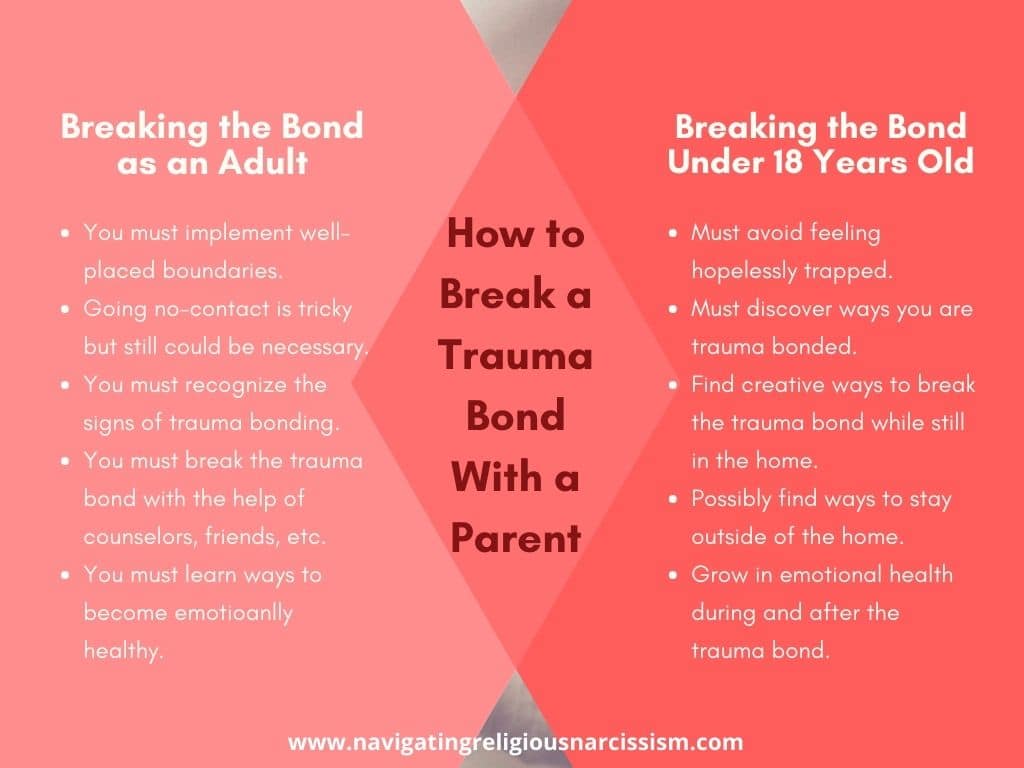Reviewed by Karis A. Williams, MSMHC, LPC, January 13, 2024
A trauma bond is a very difficult bond to break, regardless of the abuser to the victim. But it can seem almost impossible to break a trauma bond with a parent. It is the child’s first experience with bonding/relationship. It is the foundation of all other relationships they will have in their lifetime.
So, how does a child (adult or minor) break a trauma bond with a parent? If you are an adult, going to counseling together can be helpful, but as a general rule, going no-contact is likely the best way to handle a trauma bond because the whole foundation of the relationship is deeply flawed with little hope for a healthy realtionship in the future. But going no-contact can be very hard to do with family. If you are under 18, it isn’t as simple as just leave and go no-contact. Getting help from outside of the family is critical. Counseling is also a must.
There is so much to this issue though. Let’s take a look at more of the issues and some solutions as you learn the ins and outs of how to break a trauma bond with a parent. But before we do, let’s make sure we are all on the same page with some of the major concepts of trauma bonding.
If you aren’t sure exactly what trauma bonding is and would like more information on that, click here. To recognize 25 of the signs of trauma bonding, click here. And finally, if you think you may be involved in a trauma bonding relationship, take this test to get a better idea.
Once you have a pretty good idea where you or your loved ones stand in relation to trauma bonding, check out this article about the different types of trauma bonding. Then you will want to read this article about the seven stages of trauma bonding.
And last, but not least, for those that are somewhere along the road to healing, read this article next about recognizing and dealing with trauma bonding withdrawal symptoms.
And with that, let’s now take a look at when you are the child of a narcissist who could very well be trauma bonded to one or both parents.
Table of Contents
How to Break a Trauma Bond With a Parent When You are an Adult
I have already written an article about breaking a trauma bond in 11 steps. You can read that one here. The points in that article are certainly relevant to the issues surrounding breaking a trauma bond with a parent as an adult child. But there is a unique situation when the abuser in a trauma bond relationship is a parent.
People generally feel that their family of origin is a strong bond that should never be broken. Their parents gave them their life. Certainly they owe them respect, even though life has not been perfect. And honestly, as a general rule, that is a good perspective to have. But when the adult child is being abused through a trauma bond, it is no longer wise to keep themselves in that relationship with no hope to relate in a healthy way, at least not without some significant boundaries. Respect of a parent is usually a natural occurrence from birth, but over time needs to be earned through life experience and maintenance of the relationship.
To clarify, respect should still be shown through working with trauma bonding issues. But that respect should not allow the parent to continue the abuse. Indeed, it won’t look like the blind obedience the parent(s) would be expecting. Healthy boundaries will need to be put in place, even though the abuser in a trauma bond will not appreciate them or want to abide by them.
Breaking a Trauma Bond With Well-placed Boundaries
If you are not sure how to set and keep healthy boundaries, the book Boundaries by Henry Cloud and John Townsend will be a gold mine for you. It literally changed my life, not just with my narcissistic ex, but with every relationship in my life!
You will be amazed at how much this book will balance your thinking and improve your existing relationships, even when the relationship already seems healthy. This is because most healthy relationships subconsciously understand that boundaries are a necessary part of keeping those relationships healthy.
And another benefit of learning to set and maintain boundaries is that the more you practice them, the easier they get to maintain!
Going No Contact is Significantly Trickier With an Adult Child of a Narcissistic Parent
If healthy boundaries have been put in place, counselors have helped you work your way through the relationship, and there is still no progress in the relationship, it may be time to say enough is enough and get yourself to a safer place, emotionally, spiritually, and/or physically.
Often, it just isn’t possible to get past the toxity of a trauma bonded relationship. In the case of a parent-child relationship, the parent almost always has the “upper hand.” Even though you are now an adult, they may not see you that way, understand the dynamics of an adult child, or be willing to give up their percieved authority as the parent. And in those cases, there really is nothing the adult child can do for their part.
At the end of the day, adult children need to realize that when their parent or parents do not choose to heal, they will need to take measures in response in order to get to and stay in a healthy space. If that ends up needing to be going no contact, it is unfortunate but may be the only chance of truly becoming more healthy after a lifetime of trauma bonding.
In my case, I was estranged from my narcissitic mother on and off for most of my adult life. It is a hard balance to maintain as parents age and you realize time is limited and you will likely never have a meaningful relationship. But with the help of a counselor, you can figure out a plan on whether or not you will be in contact with them and what boundaries you will keep in place.
Getting to the point of being able to keep your tone even and keep your boundaries in place and healthy is a huge victory for you. And getting to this stage will allow you to relate in healthy ways in all of your other relationships.
Recognizing Trauma Bonding Signs With Your Parent(s)
Recognizing trauma bonding signs with parents is a very difficult process. Because children are with their parents from birth, they may not understand what healthy relationships look like. So they may not love their situation. But they may also not know exactly what the issues are and how to work through them.
As children, we tend to think of our parents as knowing how to live life in a wise and mature way. They are the adults, after all, right? But as we get older, we all realize how little we can know about life. And hopefully as adults, we can see other healthier relationships we are in and adjust accordingly. The important thing is to surround yourself with emotionally healthy people
This can feel too hard to figure out. But maybe one of the best criteria is to choose someone who truly listens to your feelings and can understand them as opposed to someone just saying what you want to hear. Yes, sometimes it will be very difficult to face those difficult times of healing and maturing. But a good friend or support will walk with you through that difficulty and help you get to the other side of the trauma.
Most of the other trauma bonding signs are the same as other relationships. You can read more about recognizing trauma bonds in this article. And you can read all about the signs of trauma bonding in depth in this article.
Breaking a Trauma Bond With Your Parent(s)
In a healthy relationship between parents and adult children, as the children grow up, the parents increasingly decrease their authority over the child and let them experiment with independence. The idea is that by the time they are 18 and officially an adult, they should be able to live pretty independently. That doesn’t mean they won’t share life with their parents or need their advice and help. But it does mean they are given autonomy to live their life as their own person.
In the case of a trauma bonded relationship between parent and child, the trauma bonding parent will not allow for that autonomy. Any outside influence they get is potentially harmful to the trauma bond. They could leave if they realize they don’t like the treatment of the parent. And the parent would not be able to stand the thought of that. They have to keep them under their thumb.
I do remember that my two sisters and I all talked about when we were old enough the first thing we were doing was getting out of our home. We all knew pretty early on that things weren’t right. And we had each other, our school teachers, and friends to help us keep a healthier perspective than we were getting in our home. And sure enough, we all left pretty much as soon as we turned 18. Except my younger sister left at 17 upon being emancipated.
That being said, we have all lived good adult lives, but we have also lived with the fallout of the home we were raised in.
For more information on breaking trauma bond, check out this article.
Becoming Emotionally Healthy After Breaking the Trauma Bond
If you are able to break free of the trauma bond, you are probably already involved with a counselor or trusted friends or other support on some level. And that is an incredibly good start! But at this point, you need to continue counseling with a counselor who is experienced with domestic abuse between parents and children.
You can also read all sorts of materials. Reading about trauma bonding, narcissistic abuse, and healing are all great topics. And there is no shortage of great materials. Even reading books and articles online about people who have been down the same road as you will be helpful when you see how they emerged emotionally healthy. For a good starting list, click here.
It may take you some time to get yourself on your feet. It took me about 3 years. It could take you much shorter or much longer. But once you start seeing the healing in your life, the healing will begin to snowball. And you will be thrilled at starting to feel like your own person!
In my case, when I started feeling the effects of healing, so many people told me I was a totally different person. Nearly all of them said my face was relaxed and happy. My posture was straighter and taller. And here is the icing on the cake: I was trying to reach something in the top cupboard of my kitchen cabinets. (My kitchen has tall ceilings, so the cabinets are pretty high. And I am only 5’4.”) And for the first time in the 17 years I had lived in that house, I was able to reach the thing I was trying to get almost easily and not by the edge of my fingertips! Seeing the positive physical changes was amazing to say the least.
How to Break a Trauma Bond With a Parent When you are Under 18 Years Old
If you are a child, this whole process is incredibly more difficult. You can’t just leave when you’ve had enough. You are, effectively, trapped. But there are a few things you can do.
In my case, my teachers at the small Christian school I went to all knew something was wrong in our home. They could see it in all 3 of us girls (we had no brothers). But back then, people didn’t interfere in other families’ lives. So what they tended to do was go out of their way to make our school life good. I was a nearly straight–A student. So I could pretty much do whatever I wanted during the school day. And honestly, I did anything but work. I hung out. I walked around. I drew. I wrote what I wanted to write. And once in a while I did my school work. But the majority of it was done at home in my room at night. It was my “escape” from the reality of my home life.
Children Trauma Bonded to Their Parents can Feel Hopelessly Trapped
My point in all of this is that there are options. In this day and age, if you go to school authoritites, you will likely be taken seriously and get the help you need. But unless there is physical abuse or other dangerous issues, it won’t go beyond counseling and an attempt by professionals to improve the relationship between you and your parents.
And while we are on the subject of physcial abuse or feeling unsafe, if you feel you are in any danger, please call the National Domestic Abuse Hotline at 800-799-7233 or visit them online.
The truth is, there isn’t much you can do about feeling trapped when you are a minor child and unable to go get another home. In some severe cases, you may be able to stay with a friend, relative, or even neighbor if they are involved enough to know your situation and able to help. But at the end of the day, the only sure way to get away is to be able to leave when you are an adult.
Getting counseling and outside help will be critical regardless of how you handle your home life.

How do you Discover you are in a Trauma Bond?
I touched on this a little bit at the beginning of this section. As a child, it will be hard to define your trauma bond. You may very well feel that something is wrong. And you may have thoughts in your mind as to what you would like things to look like.
I knew things were wrong in my childhood home. But there wasn’t much I could do about it. What I did do was immerse myself in books and tv that showed me what normal life actually looked like. And I dreamed about the day I could live my life normally.
One thing that I realized much later was that the picture in my head of my “normal” life was pretty unrealistic. It was over the top perfect. But over the years, life has become closer to that “dream life” than the nightmare I lived as a child.
So my biggest piece of advice to others would be to always look to outside sources. Talk to trusted people. Read. And watch good wholesome tv that will help to balance your mind.
How do you Break a Trauma Bond With Your Parent When you are a Child
It is actually very hard to break a trauma bond with a parent because you don’t have the autonomy to just get up and leave. Often you won’t even be able to leave the room you are in with the trauma bonded parent if they don’t want you to. You know that if you try, there will be hell to pay.
In my family’s case, we knew there was nowhere to go. Going to see a counselor was not a mainstream thing. Our small school didn’t have a school nurse. And honestly, back then, most kids weren’t going to the school nurse for those kinds of problems. It was more for physical ailments.
So what we did do was avoid home life as best we could. We were controlled in that we couldn’t go to our friends’ houses very often. We were very isolated. We couldn’t even play in our neighbors’ yards. But they could come to our yard. And that’s what we generally did. Because even though we couldn’t get away from our home physically, when neighbors were at our house, we were a bit safer from the normal crap we had to deal with. And the neighbor kids were rarely allowed inside. So we would be outside, which was almost like getting away.
When we were in the house, we stayed in our rooms and kept ourselves occupied. Usually books, music, and writing were the activities we did. There were no cell phones. And most homes only had one phone in the living area. So we weren’t talking to our friends.
So in effect, while you are not actually breaking the trauma bond, you are able to keep it at bay while there is little you can do about it. It likely won’t be totally broken until you are either an adult or no longer in the household.
I am glad that today is a different world. And there are so many more options for children of trauma bonds.
Growing in Emotional Health After Breaking the Trauma Bond
You can somewhat grow in emotional health just by realizing that being in a difficult home is not a good situation. And making adjustments in your routine in the home will also help put you in a better place.
Once you see a counselor and start to really be able to put words to your experience, you will start to feel like a different person. And upon leaving the home, you will literally be in a whole new world.
It is incredibly important for you to surround yourself with good people who can speak truth and goodness into your life. The sooner you do that, the sooner you will be on the path to complete healing.
What was your childhood trauma bonding experience like? How did you get help or reprieve? What were your sources of comfort? Please feel free to share below in the comments or if you need privacy, write me here.
Blessings and hugs,

If you liked this article, I think you will also love the following articles:
Can a Trauma Bond Turn into Love?
How to Break a Trauma Bond in 11 Steps
Are You Trauma Bonded? Take This Test to Find Out!
Recognizing & Dealing With Trauma Bonding Withdrawal Symptoms
Types of Trauma Bonding: What You Need to Know
The Seven Stages of Trauma Bonding: An In-depth Look
Signs of Trauma Bonding You Need to Look Out For
What to do When Your Narcissist Threatens You
The Bible Used as a Weapon Against You: You can Overcome!
What Does the Bible say About Abusive Husbands?
The Link Between Spiritual Abuse and Narcissism
What Does the Bible Say About Abusive Husbands?
The Link Between Spiritual Abuse and Narcissism
Can a Narcissist Change for Love?
Why are You Attracting Narcissists?
Why Narcissists Love Going to Church
Does a Narcissist Know They are a Narcissist?
How Religious Narcissists Think?
Can a Narcissist be a Good Person?
Narcissistic Behavior: What to Look Out For
Praying for Your Narcissistic Husband
Are Spiritual Narcissists Overt or Covert?
How to Navigate Religious Narcissistic Parents
What Happens to the Soul of a Narcissist?
How to Heal From a Spiritual Narcissist
Can You Maintain a Relationship With a Spiritual Narcissist?
Can Narcissists Have a Spiritual Awakening?
How Will God Judge a Narcissist?
When the Church Says to Move Back in With Your Narcissist
What Can We Say to a Friend Who’s Divorcing
23 Reasons Why Narcissists are Drawn to the Church
When the Church Doesn’t Recognize Narcissistic Abuse
Will the Church Support Divorcing a Narcissist?
What Does the Bible Say About Narcissism?
Can a Spiritual Narcissist Heal?
Can a Narcissist Be a Christian?
What Does the Spiritual Narcissist Do When You Try to Leave?
- How to Choose the Best Attorney When Divorcing a Narcissist - March 23, 2024
- Why Won’t God Heal my Narcissist? - February 28, 2024
- How Narcissists Use Religion to Control and Manipulate You - December 26, 2023






